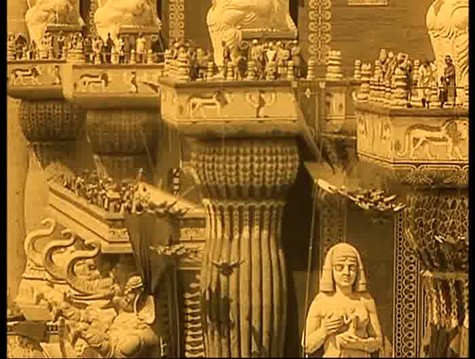Regie:
D.W. GriffithKamera:
G.W. BitzerMusik:
Carl DavisBesetzung:
Lillian Gish, Mae Marsh, Robert Harron, Sam De Grasse, Vera Lewis, Mary Alden, Elmo Lincoln, Olga Grey, Erich von Stroheim, Eugene Pallette, Wallace Reid (mehr)Inhalte(1)
Durch vier weit auseinander liegende historische Epochen - vom babylonischen Reich Nebukadnezars über das Palästina zur Zeit Christi, von der mörderischen Bartholomäusnacht in Paris 1572 bis zum Amerika anno 1915 - verfolgt Griffith die verhängnisvollen Auswirkungen des religiösen und sozialen Kasten- und Klassendenkens. Ein großer Appell für Liebe und Toleranz. (Süddeutsche Zeitung - in cooperation)
(mehr)Kritiken (2)
Die Wiege der Intoleranz, der Vergeblichkeit und der Zerstörung ist ein klassisches Griffith-Epos, das kunstvoll auf jeder Zeitebene zaubert. Aber wenn ich mir eine einzige Epoche aussuchen sollte, in der ich mehr als drei Stunden verbringen möchte, dann wäre es zweifellos die babylonische Epoche im Jahre 539 v. Chr.
()
Symbolism is certainly nothing new in film; after all, one of the pioneers of cinema, Georges Méliès, was the one who introduced this element. However, it was D. W. Griffith, who has perfected it. The conclusion of his brilliantly controversial epic The Birth of a Nation was proof of that, and the film Intolerance continues in that vein, with the woman rocking the cradle being a beautiful example of such film metaphor. No matter what happens, life goes on. Even when people are nasty to each other, they still have hope. Absolutely captivating is the storytelling format, alternating between four different stories, which was also why the film was too demanding for audiences of that time. The skipping between stories was confusing. Let's face it, audiences have a problem with that style of storytelling even today. However, D. W. Griffith once again showed his genius and ability to play with the young medium that film was. What is done with the camera, the editing, the narration, and also with the effects are elements that are still valid to this day. By the way, even the intertitles impress with their sophistication, just like the exposed breasts, which later certainly weren't commonplace. The fidelity in capturing historical periods in historical stories is truly breathtaking.
()

